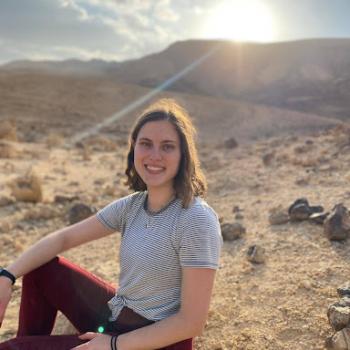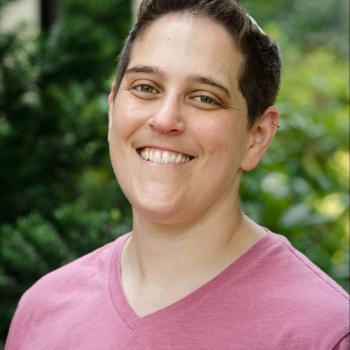Stirring Ingredients
By Alyssa Coffey, Hebrew College rabbinical student
Parshat Ki Tisa Exodus 30:11-34:35
Towards the beginning of Parshat Ki Tisa, after the laws of the half-shekel offering, we hear detailed instructions for the making of the anointing oil for the mishkan and priests, as well as the incense – ketoret – to be burned twice daily. It is the recipe for the incense (Exodus 30:34-38) which grabs my attention. The description of the incense itself manages to be at once so specific and terse that it becomes an enigma:
וַיֹּ֩אמֶר֩ יְהֹוָ֨ה אֶל־מֹשֶׁ֜ה קַח־לְךָ֣ סַמִּ֗ים נָטָ֤ף ׀ וּשְׁחֵ֙לֶת֙ וְחֶלְבְּנָ֔ה סַמִּ֖ים וּלְבֹנָ֣ה זַכָּ֑ה בַּ֥ד בְּבַ֖ד יִהְיֶֽה׃
(Ex 30:34)
“And the LORD said to Moses: Take the herbs stacte, onycha, and galbanum—these herbs together with pure frankincense; let there be an equal part of each. (JPS 1985)
Simple enough – until we see the next verse:
וְעָשִׂ֤יתָ אֹתָהּ֙ קְטֹ֔רֶת רֹ֖קַח מַעֲשֵׂ֣ה רוֹקֵ֑חַ מְמֻלָּ֖ח טָה֥וֹר קֹֽדֶשׁ׃ (Ex. 30:35)
JPS translates: “Make them into incense, a compound expertly blended, refined, pure, sacred.” Everett Fox renders the Hebrew: “You are to make with it smoking-incense, perfume, of perfumer’s

making, salted, pure—holy.”
Why does the Torah bring so many adjectives to teach how the incense ought to be made? Is this description redundant? Is it too detailed to have a clear meaning at all?
The Talmud, in Masekhet Keritot, expounds on the incense’s ingredients based on their order and linguistic structure. One famous teaching from Rav Hana bar Bizna in the name of Rabbi Shimon Hasida is that, “A fast which does not include the sinners of the Jewish people is not a fast, as the smell of galbanum is unpleasant and the verse still lists it with the ingredients of the incense” (B Keritot 6b). The lesson is not that sinners (compared to a foul smell) spoil the collective supplication of a fast, but rather that they help make it complete. This is an important reminder as we read later in our parsha of the Golden Calf (Ex. 32) – an iconic sin with a difficult aftermath which was also a step on the journey of Israel’s early relationship with God.
Yet these raw ingredients themselves — precious herbs and spices — are highly valuable, particularly in the large quantities necessary for the twice-daily incense offerings we learned about in last week’s parsha, Tetzaveh: “Aaron shall burn [the incense] every morning when he tends to the lamps, and Aaron shall burn it at twilight when he lights the lamps: A regular incense offering to the Lord throughout the ages” (Ex. 30:7-8).
Similar to the disparate translations quoted above, medieval commentators and scholars alike are divided on what the word memulach (30:35) means. I am drawn to Rashi’s explanation, who bases his comments on the Targum:
“Mixed — that they should thoroughly mix the powder of the ingredients. Similar to it: “Then the mariners (המלחים) were afraid” (Jonah 1:5); (Ezekiel 27:27) “your mariners (מלחיך)” (Ezekiel 27:27), who are named because they turn over the water with oars when they propel the ship, like a person who stirs up eggs with a spoon in order to mix them with water.”
Just as rowers mix up the water with their oars, so too must the mixture of ground herbs be stirred. In Rashi’s metaphor, the powdered incense is the water. But imagine if this image had a different emphasis: What if we were not gliding along the water’s surface, but some part of us were also being stirred up in the action and effort of rowing?
The Talmud also teaches that incense – ketoret – is “an item that produces smoke [koter] and rises” (B Keritot 6b). Yet Judaism is no longer a tradition of sacrifice. What rises is not the smoke of ketoret, but the words of our prayers. As the Psalmist writes:
מִזְמ֗וֹר לְדָ֫וִ֥ד יְהֹוָ֣ה קְ֭רָאתִיךָ ח֣וּשָׁה לִּ֑י הַאֲזִ֥ינָה ק֝וֹלִ֗י בְּקׇרְאִי־לָֽךְ׃
תִּכּ֤וֹן תְּפִלָּתִ֣י קְטֹ֣רֶת לְפָנֶ֑יךָ מַֽשְׂאַ֥ת כַּ֝פַּ֗י מִנְחַת־עָֽרֶב׃
A psalm of David.
I call You, O LORD, hasten to me; give ear to my cry when I call You.
Take my prayer as an offering of incense, my upraised hands as an evening sacrifice
(Ps. 141:1-2)
I imagine the words of my prayers, like the smoke of incense, rising up in delicate wisps. They leave traces of their sounds behind to linger gently in the air. Perhaps my prayers linger not only for God’s ears, but also within me: some mix of mysterious feeling and wordless yearning. I imagine myself in a small, private rowboat: heart beating and legs burning from the exertion, breath and soul churning within me as I rest my oars for a moment, and the water beneath me begins to settle.
Alyssa Coffey (she/her) is a rabbinical student at Hebrew College, where she also serves as Editor of the 70 Faces of Torah blog. Prior to rabbinical school, she studied religion and history at Hampshire College, worked at a Jewish social service organization in Chicago, and spent two years studying in Jerusalem at Pardes. When not learning Torah, Alyssa is often knitting, spinning yarn, or solving puzzles.

















